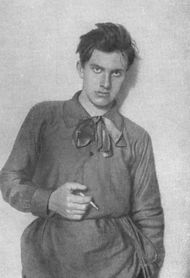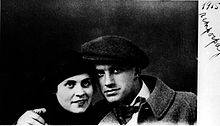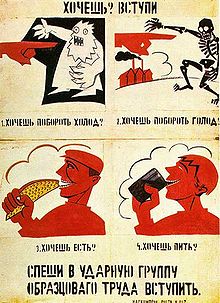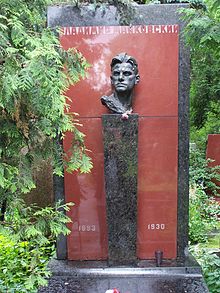- Vladimir Mayakovsky
-
"Mayakovsky" redirects here. For other uses, see Mayakovsky (disambiguation).
Vladimir Mayakovsky 
Born July 19, 1893
Baghdati, Russian EmpireDied April 14, 1930 (aged 36)
Moscow, USSRNationality Russian Citizenship Russian Empire, Soviet Alma mater Stroganov Moscow State University of Arts and Industry, Moscow School of Painting, Sculpture and Architecture Period 1912—1930 Literary movement Russian Futurism, Cubo-Futurism Vladimir Vladimirovich Mayakovsky (Влади́мир Влади́мирович Маяко́вский) (July 19 [O.S. July 7] 1893 – April 14, 1930) was a Russian and Soviet poet and playwright, among the foremost representatives of early-20th century Russian Futurism.
Contents
Early life
He was born the last of three children in Baghdati, Russian Empire (now in Georgia) where his father worked as a forest ranger. His father was of Ukrainian Cossack descent[1] and his mother was of Ukrainian descent. Although Mayakovsky spoke Georgian at school and with friends, his family spoke primarily Russian at home. At the age of 14 Mayakovsky took part in socialist demonstrations at the town of Kutaisi, where he attended the local grammar school. After the sudden and premature death of his father in 1906, the family — Mayakovsky, his mother, and his two sisters — moved to Moscow, where he attended School No. 5.
In Moscow, Mayakovsky developed a passion for Marxist literature and took part in numerous activities of the Russian Social Democratic Labour Party; he was to later become an RSDLP (Bolshevik) member. In 1908, he was dismissed from the grammar school because his mother was no longer able to afford the tuition fees.
Around this time, Mayakovsky was imprisoned on three occasions for subversive political activities but, being underage, he avoided transportation. During a period of solitary confinement in Butyrka prison in 1909, he began to write poetry, but his poems were confiscated. On his release from prison, he continued working within the socialist movement, and in 1911 he joined the Moscow Art School where he became acquainted with members of the Russian Futurist movement. He became a leading spokesman for the group Gileas (Гилея), and a close friend of David Burlyuk, whom he saw as his mentor.
Literary life
The 1912 Futurist publication A Slap in the Face of Public Taste (Пощёчина общественному вкусу)[2] contained Mayakovsky's first published poems: Night (Ночь) and Morning (Утро). Because of their political activities, Burlyuk and Mayakovsky were expelled from the Moscow Art School in 1914.
His work continued in the Futurist vein until 1914. His artistic development then shifted increasingly in the direction of narrative and it was this work, published during the period immediately preceding the Russian Revolution, which was to establish his reputation as a poet in Russia and abroad.
A Cloud in Trousers (1915)[3] was Mayakovsky's first major poem of appreciable length and it depicted the heated subjects of love, revolution, religion and art, written from the vantage point of a spurned lover. The language of the work was the language of the streets, and Mayakovsky went to considerable lengths to debunk idealistic and romanticised notions of poetry and poets.
Your thoughts,
dreaming on a softened brain,
like an over-fed lackey on a greasy settee,
with my heart's bloody tatters I'll mock again;
impudent and caustic, I'll jeer to superfluity.Of Grandfatherly gentleness I'm devoid,
there's not a single grey hair in my soul!
Thundering the world with the might of my voice,
I go by – handsome,
twenty-two-year-old.Вашу мысль
мечтающую на размягченном мозгу,
как выжиревший лакей на засаленной кушетке,
буду дразнить об окровавленный сердца лоскут:
досыта изъиздеваюсь, нахальный и едкий.У меня в душе ни одного седого волоса,
и старческой нежности нет в ней!
Мир огромив мощью голоса,
иду – красивый,
двадцатидвухлетний.(From the prologue of A Cloud in Trousers.)
In the summer of 1915, Mayakovsky fell in love with a married woman, Lilya Brik, and it is to her that the poem "The Backbone Flute" (1916) was dedicated; she was the wife of his publisher, Osip Brik. The love affair, as well as his impressions of war and revolution, strongly influenced his works of these years. The poem "War and the World" (1916) addressed the horrors of World War I and "Man" (1917) is a poem dealing with the anguish of love.
Mayakovsky was rejected as a volunteer at the beginning of World War I, and during 1915-1917 worked at the Petrograd Military Automobile School as a draftsman. At the onset of the Russian Revolution, Mayakovsky was in Smolny, Petrograd. There he witnessed the October Revolution. He started reciting poems such as "Left March! For the Red Marines: 1918" (Левый марш (Матросам), 1918) at naval theatres, with sailors as an audience.
 Vladimir Mayakovsky and Lilya Brik.
Vladimir Mayakovsky and Lilya Brik.
His satirical play Mystery-Bouffe was staged in 1918, and again, more successfully, in 1921.
After moving back to Moscow, Mayakovsky worked for the Russian State Telegraph Agency (ROSTA) creating — both graphic and text — satirical Agitprop posters. In 1919, he published his first collection of poems Collected Works 1909-1919 (Все сочиненное Владимиром Маяковским). In the cultural climate of the early Soviet Union, his popularity grew rapidly. From 1922 to 1928, Mayakovsky was a prominent member of the Left Art Front and went on to define his work as 'Communist futurism' (комфут). He edited, along with Sergei Tretyakov and Osip Brik, the journal LEF.
As one of the few Soviet writers who were allowed to travel freely, his voyages to Latvia, Britain, Germany, the United States, Mexico and Cuba influenced works like My Discovery of America (Мое открытие Америки, 1925). He also travelled extensively throughout the Soviet Union.
On a lecture tour in the United States, Mayakovsky met Elli Jones, who later gave birth to his daughter, an event which Mayakovsky only came to know in 1929, when the couple met clandestinely in the south of France, as the relationship was kept secret. In the late 1920s, Mayakovsky fell in love with Tatiana Yakovleva and to her he dedicated the poem "A Letter to Tatiana Yakovleva" (Письмо Татьяне Яковлевой, 1928).
The relevance of Mayakovsky's influence cannot be limited to Soviet poetry. While for years he was considered the Soviet poet par excellence, he also changed the perceptions of poetry in wider 20th century culture. His political activism as a propagandistic agitator was rarely understood and often looked upon unfavourably by contemporaries, even close friends like Boris Pasternak. Near the end of the 1920s, Mayakovsky became increasingly disillusioned with the course the Soviet Union was taking under Joseph Stalin: his satirical plays The Bedbug (Клоп, 1929) and The Bathhouse (Баня, 1930), which deal with the Soviet philistinism and bureaucracy, illustrate this development.
On the evening of April 14, 1930, Mayakovsky shot himself. The unfinished poem[4] in his suicide note read, in part:
And so they say-
"the incident dissolved"
the love boat smashed up
on the dreary routine.
I'm through with life
and [we] should absolve
from mutual hurts, afflictions and spleen.The Soviet officials announced that Mayakovsky shot himself directly in his heart, because of his breakup with actress Veronika Polonskaya (hardly a reason for Mayakovsky to commit suicide). Ten days after Mayakovsky's death the criminal investigator of the Mayakovsky's case was also shot dead fueling arguments about Mayakovsky's death[5].
Mayakovsky was interred at the Moscow Novodevichy Cemetery.Legacy
In 1930, his birthplace of Bagdadi in Georgia was renamed Mayakovsky in his honour. After his death, Mayakovsky was attacked in the Soviet press as a "formalist" and a "fellow-traveller" (попутчик) (as opposed to officially recognised "proletarian poets", such as Demyan Bedny). When, in 1935, Lilya Brik wrote to Stalin to complain about the attacks, Stalin wrote a comment on Brik's letter:
"Comrade Yezhov, please take charge of Brik's letter. Mayakovsky is still the best and the most talented poet of our Soviet epoch. Indifference to his cultural heritage is a crime. Brik's complaints are, in my opinion, justified..."[6]
These words became a cliché and officially canonized Mayakovsky but, as Boris Pasternak noted,[7] they "dealt him the second death" in some circles.
In 1938 the Mayakovskaya Metro Station was opened to the public, demonstrating various innovations in architecture and design, among them the display of ceiling mosaics that resemble a "fish-eye" view from the underground to the Moscow sky.
Yevgeny Yevtushenko once said, "As a poet, I wanted to mix something from Mayakovsky and Yesenin."[8] Mayakovsky was the most influential futurist in Lithuania and his poetry helped to form the Four Winds movement there.[9] He was also an influence on the writer Valentin Kataev. Andrey Voznesensky called Mayakovsky a teacher and favorite poet[10] and dedicated a poem to him entitled Маяковский в Париже (Mayakovsky in Paris).[11] In 1967 the Taganka Theater staged the poetical performance Послушайте!, based on Mayakovsky's works. The role of the poet was played by Vladimir Vysotsky, who also was inspired by Mayakovsky's poetry.[12]
In 1974 a Russian State Museum of Mayakovsky was opened in the center of Moscow in the building where Mayakovsky resided from 1919 to 1930.[13] Vladimir Mayakovsky and his works were a major influence on the work of Italian actor, film director and screenwriter Carmelo Bene, who interpreted Mayakovsky on the stages of theatres in Italy and on TV from the early 1970s until his death in 2002. Frank O'Hara wrote a poem named after him, "Mayakovsky" in which the speaker is standing in a bathtub, a probable reference to his play "The Bathhouse". O'Hara also mentions Mayakovsky in his poem "A True Account of Talking to the Sun at Fire Island," which is modeled after Mayakovsky's "An Extraordinary Adventure Which Befell Vladimir Mayakovsky in a Summer Cottage." In 1981 Brazilian singer Gal Costa recorded "O Amor" a Portuguese version of one of Mayakovsky's latter poems in her album Fantasia. In 1986 English singer and songwriter Billy Bragg recorded the album Talking with the Taxman about Poetry, named after a namesake Mayakovsky's poem. In 1991, City Lights published Listen! Early Poems, a collection translated by Maria Enzensberger. The well-known phrase "Lenin lives, lived and will live" comes from his elegy "Vladimir Ilyich Lenin".
In 2005 the north exit of the Mayakovskaya Metro Station was opened, referencing the architecture of the underground station with ample sculpturing of marble, stainless steel and another group of ceiling mosaic works, accompanied by the artist's poems. In 2009, Italian alternative rock band, Il Teatro Degli Orrori, released a song entitled "Majakowskij". The lyrics of the song are the Italian translation of his 1916 poem To His Beloved Self, the Author Dedicates these Lines (Себе любимому посвещает эти строки автор).[14] In 2010, in collaboration with Found Reality Theatre, students at the University of Glamorgan staged a physical theatre piece entitled The Mayakovsky Project in the Atrium, Cardiff.[15] Using Mayakovsky's life as template, the performance posed the question, "Why do they kill the artists?"[citation needed]
In 2007 Craig Volk's stage bio-drama "Mayakovsky Takes The Stage" (based on his screenplay "At The Top Of My Voice") won the PEN-USA award for Best Stage Drama[citation needed].
References
- ^ "Маяковский Владимир Владимирович. В. Маяковский в воспоминаниях современников [Mayakovsky, Vladimir Vladimirovich. Vladimir Mayakovsky in the memoirs of contemporaries]" (in Russian) (SHTML). Lib.ru. http://az.lib.ru/m/majakowskij_w_w/text_0212.shtml. Retrieved 7 April 2010.
- ^ "A Slap in the Face of Public Taste". Futurism. The Niuean Pop Cultural Archive. http://www.unknown.nu/futurism/slap.html. Retrieved 7 April 2010.
- ^ "A Cloud in Trousers (Part 1) by Vladimir Mayakovsky". vmlinux.org. http://vmlinux.org/ilse/lit/mayako.htm. Retrieved 7 April 2010.
- ^ Belyayeva Dina. "B. Маяковский-Любовная лодка разбилась о быт... En [V. Mayakovsky - The Love Boat smashed up on the dreary routine ... En]" (in Russian and English). poetic translations. Stihi.ru - national server of modern poetry. http://www.stihi.ru/2008/12/11/3799. Retrieved 7 April 2010.
- ^ Shelokhonov, Steve. "Biography for Vladimir Mayakovsky". IMDB. http://www.imdb.com/name/nm0562194/bio. Retrieved October 12, 2011.
- ^ Katanyan, Vasily (1998) Memoirs. p. 112
- ^ http://www.russ.ru/krug/20030723_ls.html
- ^ [1]
- ^ http://www.tekstai.lt/tekstai/4vejai/apie/nyliunas.htm
- ^ http://www.ogoniok.com/archive/2002/4734/08-08-11/
- ^ http://www.ruthenia.ru/60s/voznes/antimir/mayakovskij.htm
- ^ http://taganka.theatre.ru/press/articles/5392/
- ^ http://www.mayakovsky.info/museum.html
- ^ "Il Teatro Degli Orrori Sangue Freddo CD" (ASP). CD Universe. http://www.cduniverse.com/productinfo.asp?pid=8038975. Retrieved 7 April 2010.
- ^ "THE MAYAKOVSKY PROJECT" (ASP). News and latest information on Theatre Dance and Performance in Wales. Theatre in Wales. 16 February 2010. http://www.theatre-wales.co.uk/news/newsdetail.asp?newsID=3448. Retrieved 7 April 2010.
Bibliography
- Aizlewood, Robin. Verse form and meaning in the poetry of Vladimir Maiakovsky: Tragediia, Oblako v shtanakh, Fleita-pozvonochnik, Chelovek, Liubliu, Pro eto (Modern Humanities Research Association, London, 1989).
- Brown, E. J. Mayakovsky: a poet in the revolution (Princeton Univ. Press, 1973).
- Charters, Ann & Samuel. I love : the story of Vladimir Mayakovsky and Lili Brik (Farrar Straus Giroux, NY, 1979).
- Humesky, Assya. Majakovskiy and his neologisms (Rausen Publishers, NY, 1964).
- Jangfeldt, Bengt. Majakovsky and futurism 1917-1921 (Almqvist & Wiksell International, Stockholm, 1976).
- Lavrin, Janko. From Pushkin to Mayakovsky, a study in the evolution of a literature. (Sylvan Press, London, 1948).
- Mayakovsky, Vladimir (Patricia Blake ed., trans. Max Hayward and George Reavey). The bedbug and selected poetry. (Meridian Books, Cleveland, 1960).
- Mayakovsky, Vladimir. Mayakovsky: Plays. Trans. Guy Daniels. (Northwestern University Press, Evanston, Il, 1995). ISBN 0810113392.
- Mayakovsky, Vladimir. For the voice (The British Library, London, 2000).
- Mayakovsky, Vladimir (ed. Bengt Jangfeldt, trans. Julian Graffy). Love is the heart of everything : correspondence between Vladimir Mayakovsky and Lili Brik 1915-1930 (Polygon Books, Edinburgh, 1986).
- Mayakovsky, Vladimir (comp. and trans. Herbert Marshall). Mayakovsky and his poetry (Current Book House, Bombay, 1955).
- Mayakovsky, Vladimir. Selected works in three volumes (Raduga, Moscow, 1985).
- Mayakovsky, Vladimir. Selected poetry. (Foreign Languages, Moscow, 1975).
- Mayakovsky, Vladimir (ed. Bengt Jangfeldt and Nils Ake Nilsson). Vladimir Majakovsky: Memoirs and essays (Almqvist & Wiksell Int., Stockholm 1975).
- Mayakovsky, Vladimir. Satira ('Khudozh. lit.,' Moscow, 1969).
- Mikhailov, Aleksandr Alekseevich. Maiakovskii (Mol. gvardiia, Moscow, 1988).
- Novatorskoe iskusstvo Vladimira Maiakovskogo (trans. Alex Miller). Vladimir Mayakovsky: Innovator (Progress Publishers, Moscow, 1976).
- Noyes, George R. Masterpieces of the Russian drama (Dover Pub., NY, 1960).
- Nyka-Niliūnas, Alfonsas. Keturi vėjai ir keturvėjinikai (The Four Winds literary movement and its members), Aidai, 1949, No. 24. (Lithuanian)
- Rougle, Charles. Three Russians consider America : America in the works of Maksim Gorkij, Aleksandr Blok, and Vladimir Majakovsky (Almqvist & Wiksell International, Stockholm, 1976).
- Shklovskii, Viktor Borisovich. (ed. and trans. Lily Feiler). Mayakovsky and his circle (Dodd, Mead, NY, 1972).
- Stapanian, Juliette. Mayakovsky's cubo-futurist vision (Rice University Press, 1986).
- Terras, Victor. Vladimir Mayakovsky (Twayne, Boston, 1983).
- Vallejo, César (trans. Richard Schaaf) The Mayakovsky case (Curbstone Press, Willimantic, CT, 1982).
- Volk, Craig, "Mayakovsky Takes The Stage" (full-length stage drama), 2006 and "At The Top Of My Voice" (feature-length screeplay), 2002.
- Wachtel, Michael. The development of Russian verse : meter and its meanings (Cambridge University Press, 1998).
External links
- Selected Poems of Vladimir Mayakovsky translated into English by A. Kneller
- Biography
- State Museum of Mayakovsky in Moscow (Russian/English)
- Between Agitation and Animation: Activism and Participation in Twentieth Century Art by Stella Rollig
- Radio Mayakovsky More than 100 new songs written to the Mayakovsky verses. Mayakovsky Voice, Verses Readers and other stuff
- Vladimir Mayakovsky's Gravesite
- "Баня" ("The Bathhouse"): Mayakovsky and Meyerhold)
- Meyerhold & Mayakovsky - Biomechanics & the Communist Utopia
- The 'raging bull' of Russian poetry article by Dalia Karpel at Haaretz.com, published on-line July 5, 2007
- Archival film edited by Copernicus Films
- English translations of Take that! (Нате!), The love boat smashed up on the dreary routine... (Любовная лодка разбилась о быт).
- Chapter on Russian Futurists incl Mayakovsky in Trotsky's Literature and Revolution
- Mayakovsky in the Soviet fine arts
- English translations of 3 poems from 1913
- English translation of I by Alex Cigale
- English translations of 3 film treatments c. 1918 by Alex Cigale
- Vladimir Mayakovsky at Find a Grave
Categories:- 1893 births
- 1930 deaths
- Bolsheviks
- Burials at Novodevichy Cemetery
- Deaths by firearm in Russia
- Futurist writers
- Marxist writers
- Ukrainian writers
- Marxist poets
- Modernist drama, theatre and performance
- Old Bolsheviks
- Revolutionaries who committed suicide
- Russian Social Democratic Labour Party members
- Russian avant-garde
- Russian communists
- Ukrainian communists
- Russian dramatists and playwrights
- Russian Futurism
- Russian Marxists
- Ukrainian Marxists
- Russian poets
- Russian artists
- Russian painters
- Russian revolutionaries
- Ukrainian poets
- Ukrainian artists
- Ukrainian painters
- Russian people of Ukrainian descent
- Soviet poets
- Soviet dramatists and playwrights
- Suicides by firearm in the Soviet Union
- Writers who committed suicide
- Poets who committed suicide
Wikimedia Foundation. 2010.





